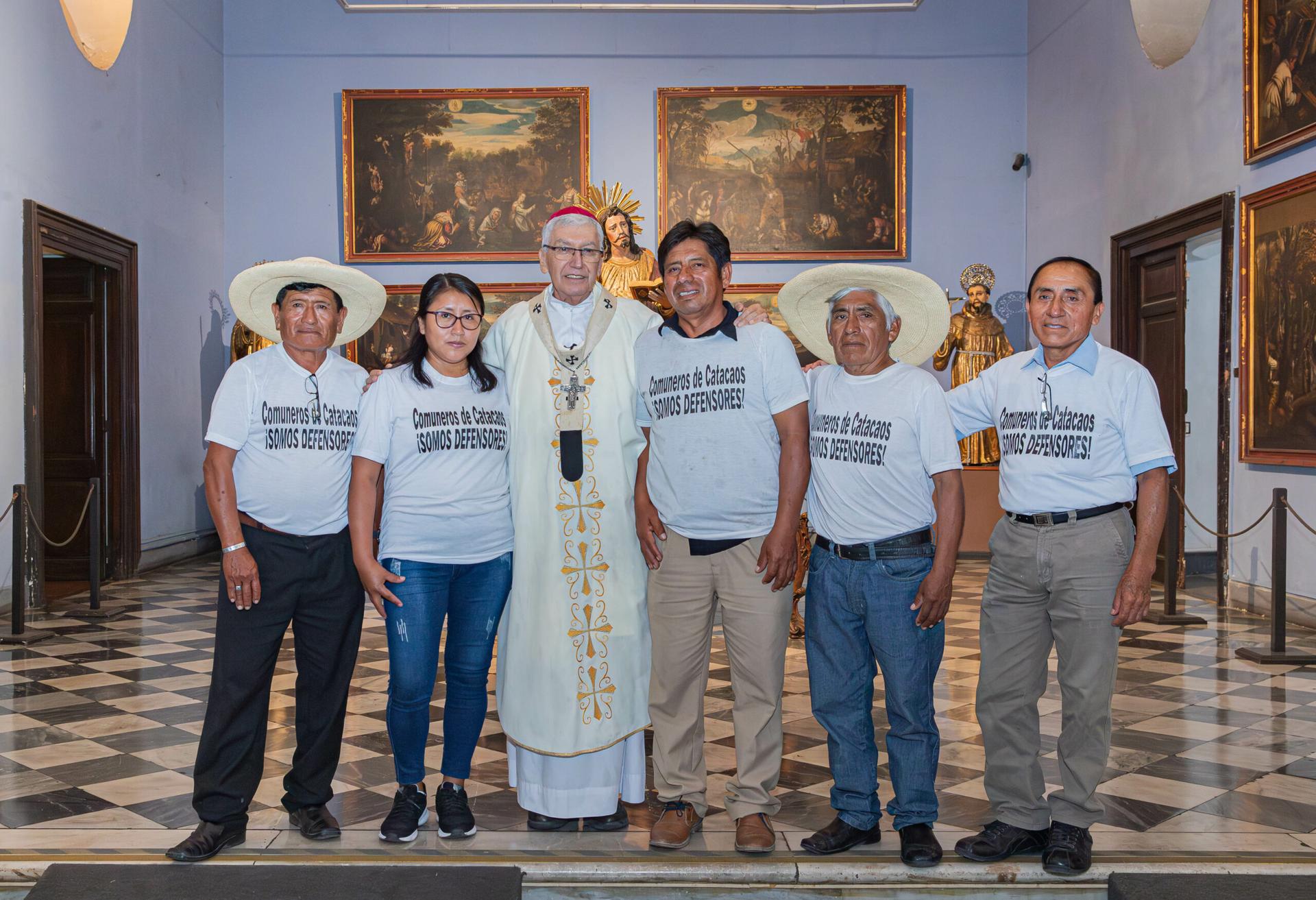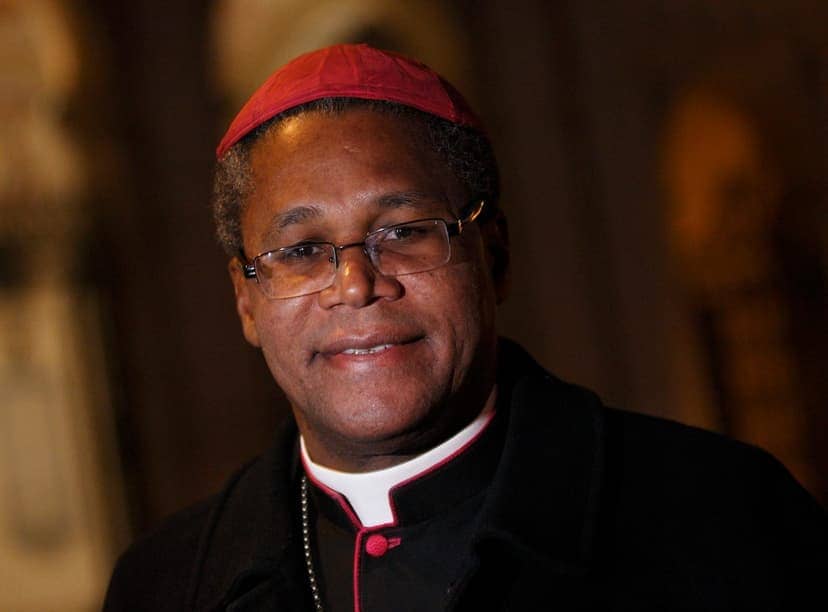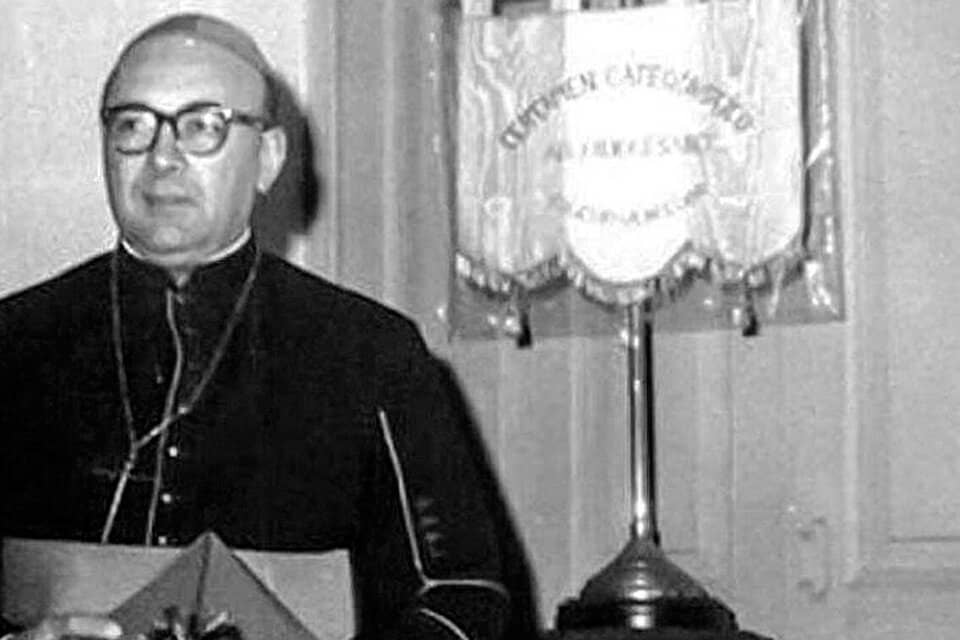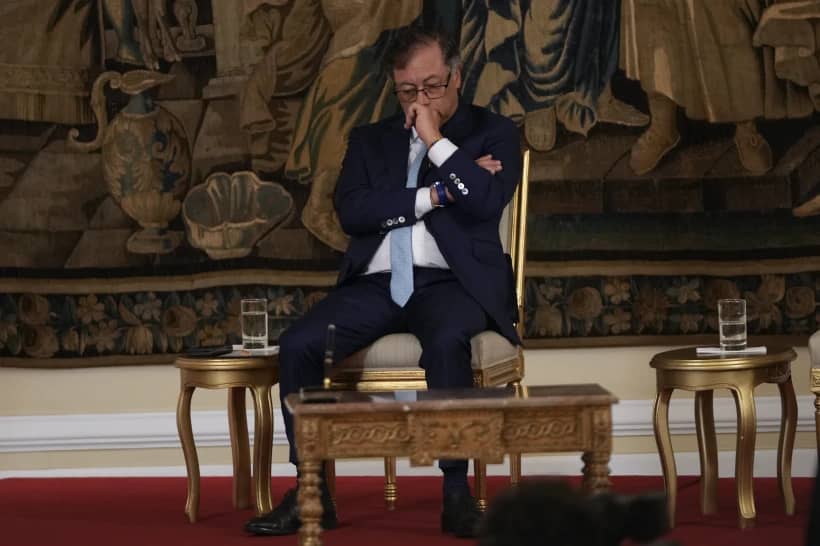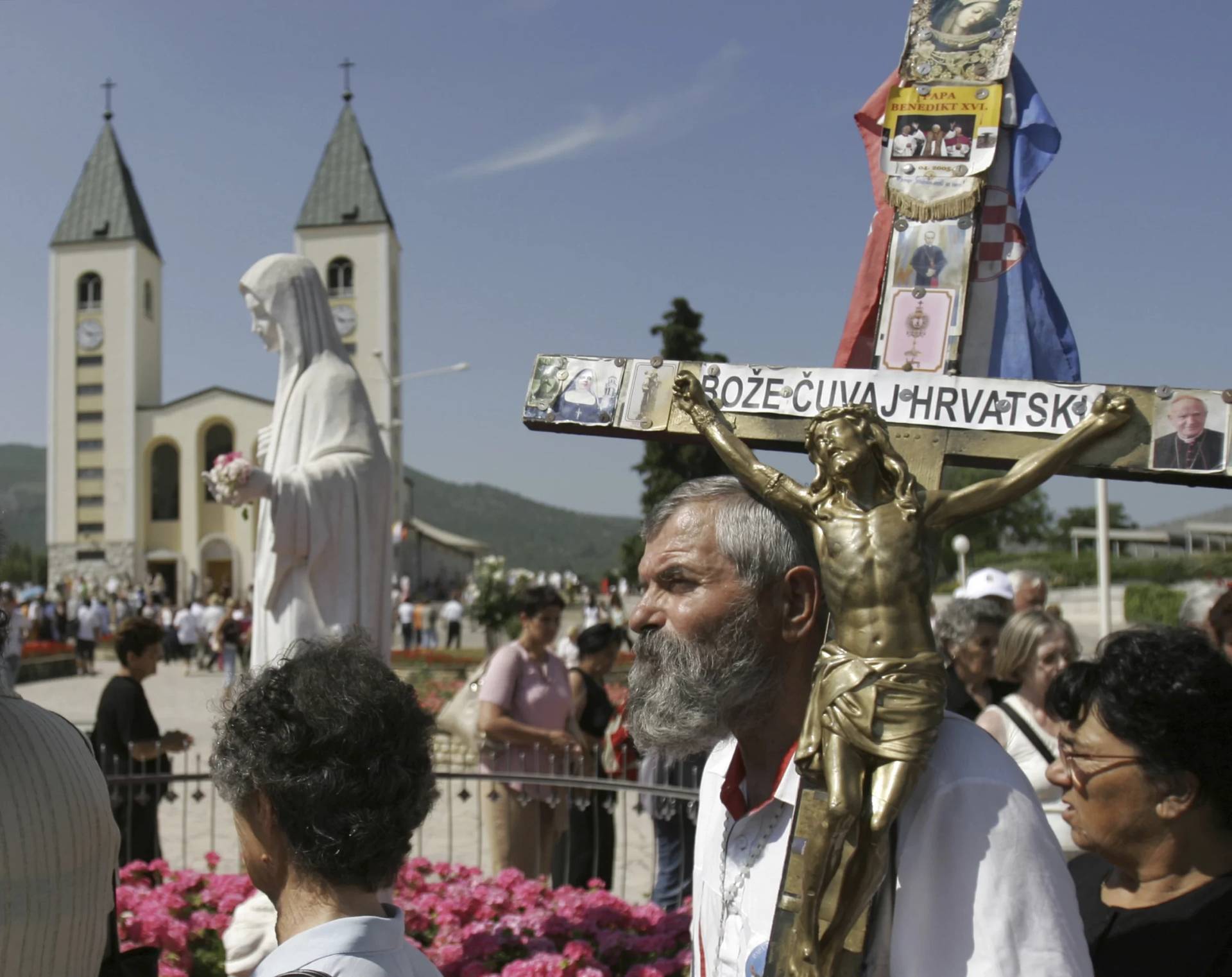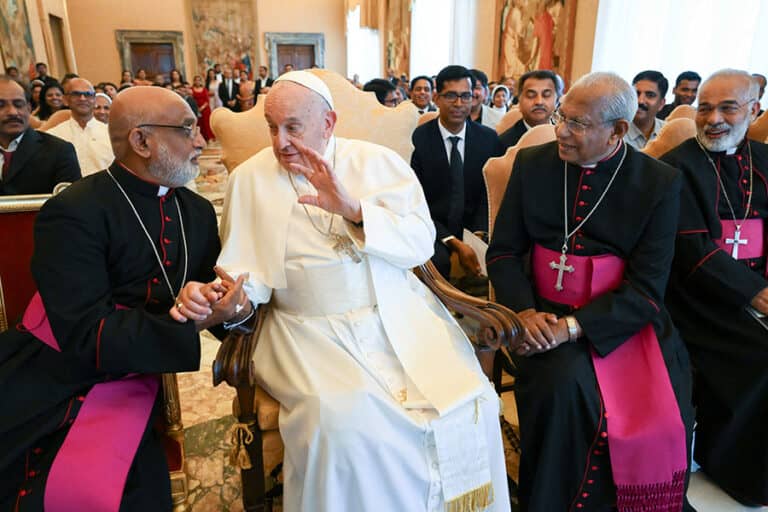ROME – Several peasant farmers claiming legal and physical harassment by a Catholic group in Peru currently under investigation by the Vatican were received by the archbishop of Lima over the weekend, shortly after receiving further complaints from the group.
On Sunday, Archbishop Carlos Castillo of Lima met with members of the peasant farming community of Catacaos in Piura, who travelled to Lima after receiving what they said were new threats from an organization associated with the scandal plagued Sodalitium Christianae Vitae (SCV).
In a video message shared on social media, Fiorella Martinez, whose husband Guadalupe Zapata Sosa was apparently killed defending their land from outsiders seeking to drive them out, voiced gratitude for the meeting with Castillo, which took place after Mass in the city’s cathedral.
Martinez thanked God and the Peru Coordinator for Human Rights “for having given us the opportunity to present ourselves here,” saying she is still “looking for justice for the death of Guadalupe Zapata Sosa.”
She also presented a jar of honey made on their lands, saying it comes “from the heart” of Catacaos, and is “the fruit of our labor” and “cultural richness.”
A lay group founded by Peruvian layman Luis Fernando Figari in the 1970s, the SCV for nearly ten years has been shrouded by scandals involving allegations of sexual, physical, and psychological abuse, as well as abuses of power and authority and accusations of financial corruption against Figari and other top-ranking members.
Figari himself was accused of physical, psychological, and sexual abuse within the community, including sexual abuse of minors, and in 2017 was sanctioned by the Vatican and prohibited from having further contact with members of the group. He is currently living in exile in southern Italy.
Last summer Pope Francis dispatched his top abuse investigating team, Maltese Archbishop Charles Scicluna and Spanish Monsignor Jordi Bertomeu, to Lima to begin a formal inquiry into SCV and its various attempts at reform.
As part of their inquiries, Scicluna and Bertomeu met with members of the Catacaos community and a top member of the SCV, Archbishop José Antonio Eguren, who earlier this month resigned from leadership of the Piura archdiocese amid the Vatican’s ongoing investigation.
Eguren, 67, has been accused of financial corruption and land trafficking in Piura, including the legal harassment of the Catacaos community, founded in 1578 by Virrey Toledo, making it the oldest of the peasant communities in Peru.
It is common throughout much of Latin America for peasants and members of the poorer classes to establish roots on a patch of inexpensive land and live there undisturbed for decades, or even hundreds of years, while having no formal title to the land on which they live, usually due to a lack of money or legal support.
Companies who want to buy up the land will often strike a deal with the titleholder and effectively run the inhabitants out of town through threats and intimidation, at times resorting to violence carried out by criminal groups.
In the province of Piura, farmers from Catacaos since 2012 have been battling both threats from criminal groups and legal suits by companies of the SCV, including the Saint John the Baptist Civil Association, who wish to buy up the land they occupy and drive them out in order to develop it for profit.
Pope Francis sent an April 13 video message to the Catacaos community marking the 446th anniversary of its founding, telling community members, “I know what happened to you.”
“Defend your land, don’t let it be stolen,” he said, and thanked the community for its work, assuring them of his prayers and giving them his blessing.
On April 16, in response to the pope’s video, the Saint John the Baptist Civil Association issued a threatening statement against the community of Catacaos in which they insist that none of their associates, representatives or collaborators “have committed violations of the law or abuse of persons.”
“Currently no complaint or lawsuit exists against the Saint John the Baptist Civil Association or any other person that has participated in the acquisition of the lands in question,” they said.
The organization explained that they purchased the land on which the Catacaos community lives in 2012, having made a deal “with the owners legally registered in public records, with the goal of promoting agricultural and building developments, seeking to obtain surpluses for the fulfillment of its mission.”
Referring to the pope’s video, the organization denied any criminal activity, including allegations of “usurpation of land” and violent action.
They took aim at the leader of the Catacaos community Marcelino Ynga, who participated in Sunday’s meeting with Castillo, saying Ynga “in a malicious and defamatory way, linked the Saint John the Baptist Civil Association to the criminal acts of usurpation of land, the murder of farmers, that qualify as a criminal organization, when for these issues, as we have said above, there is no complaint or lawsuit.”
“The one who has been investigated for usurpation of land, violence, aggravated robbery, and aggression against persons in the Piura Region, is Mr. Ynga,” they said, referring to lawsuits they have filed against him.
The organization also denied any ties with Eguren, saying Eguren led their association until April 27, 2001, when he formally stepped down from that role, meaning “he was disassociated from the Saint John the Baptist Association more than 11 years before it began the acquisition of the lands in Catacaos.”
In addition to land trafficking allegations, Eguren in 2018 also faced sharp public backlash for issuing criminal defamation suits against journalists Pedro Salinas and Paola Ugaz, who uncovered the SCV scandals. He later retracted those complaints after facing criticism from his fellow bishops, with the support of the pope.
In response to the pope’s video, the organization in its statement said it would send documentation to the Vatican’s Apostolic Nunciature in Lima proving “that on our part there has never been the expropriation of lands nor any other illicit action,” with the hope that this information reaches Pope Francis so as “to clarify any doubt about the procedure of our Association.”
👇🏽👇🏽👇🏽 pic.twitter.com/zgTh4h5gTe
— pedro salinas (@chapatucombi) April 28, 2024
They closed their statement calling on Peruvian citizens, as well as the media, to “not let themselves be surprised by a sector of the press that, in a painful way, is misinforming public opinion,” and invited people to contact their spokesman with any questions or concerns.
In the video published after their meeting with Castillo, a member of the Catacaos community identified as Santos thanked Castillo for his “good reception and welcome,” saying the archbishop received them “with a lot of gentleness, a lot of affection.”
Castillo, he said, “recognizes the suffering we have experienced as farmers, what we are going through with these attempts to steal our communal lands, which they come to steal, and they threaten many community members, putting them on trial.”
He said that between 12-20 members of the Catacaos community have been “criminalized” through legal complaints by groups associated with the SCV, including the Saint John the Baptist Civil Association, adding, “but thanks to God, I believe there will be justice for us.”
Ynga himself noted in the video that the farmers in Catacaos produce honey, “an organic honey made in our fields, which is a fruit of our work and our culture and is the only source of work for all of the community members.”
“To all community members in our beloved Peru, let us defend our voice,” he said.
At the end of Sunday’s Mass, Castillo gave a special shout-out to the Catacaos community, offering a blessing “so that in their fight and their efforts, justice can be achieved for their cause, and also for those who have helped them.”
To this end, he pointed to help provided through the Peru commission for human rights, “but above all journalists, three journalists who are helping them a lot and continuing to accompany them so that they are not alone.”
“This blessing is also for those who are wounded, who have been impacted” by the situation, and “this action against them,” he said.
Follow Elise Ann Allen on X: @eliseannallen
